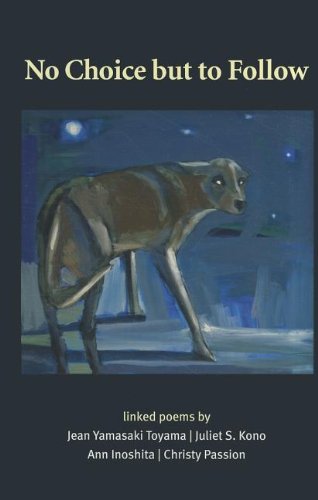The official Renshi series are sponsored in partnership with the Hawaiʻi Council for the Humanities (HCH).

Linked poems or verse come from the classical Japanese tradition called “renga,” or “renku”. The modern version, “renshi,” was created and popularized by Japanese poet Makoto Ooka. Whether followed by the kanji for song (ga), verse (ku), or poetry (shi), the expression is always preceded by the character “ren” which can be translated as link, connect, join, and group. While specifically pertaining to the thing produced, it also pertains to the process. For it is not only the linking of verses but the connecting of poets, that is important. The solitary poet of the West is contrasted with the community of poets of renshi. A competition of sorts—each poet wonders what the next poet will be able to do with the last line she has tossed her comrade—it is also a collaborative act.
No Choice but to FollowView this Renshi series
Bamboo Ridge Issue #96 is a special collection of 48 renshi (linked) poems by Jean Yamasaki Toyama, Juliet S. Kono, Ann Inoshita, and Christy Passion. Originally published as weekly website postings to commemorate Bamboo Ridge’s 30th anniversary, the poets’ year-long journey resulted in No Choice but to Follow, a combination book and CD.
Four Voices in Renshi: The Massie AffairView this Renshi series
The Massie Case obsessed all of America in the early 1930s and remains one of the most controversial events in Hawaiʻi history. The case highlighted racial conflicts between locals and recently arrived haoles (military personnel, government representatives, and the territorial haole elite). On September 12, 1931, Thalia Massie, wife of Naval officer Thomas Massie, was allegedly assaulted and raped in Waikīkī by five local men. What followed were two notorious trials that threatened to undermine the delicate racial balance of the Territory of Hawaiʻi. When a mistrial was declared and the five local men accused of the assault were set free, Lt. Massie, Thalia’s mother Grace Fortescue, and two enlisted men kidnapped and murdered one of the defendants, Joseph Kahahawai. Arrested and charged with manslaughter, the four haole defendants were represented by the famous lawyer Clarence Darrow. When they were found guilty of manslaughter, Territorial Governor Lawrence Judd commuted their sentences to one hour served in his company. (Adapted from Dennis Carroll’s article in Kumu Kahua’s Viewer’s Guide.)
This project was funded, in part, by a grant from the Hawaiʻi Council for the Humanities (HCH) — a development partner of Bamboo Ridge Press.




